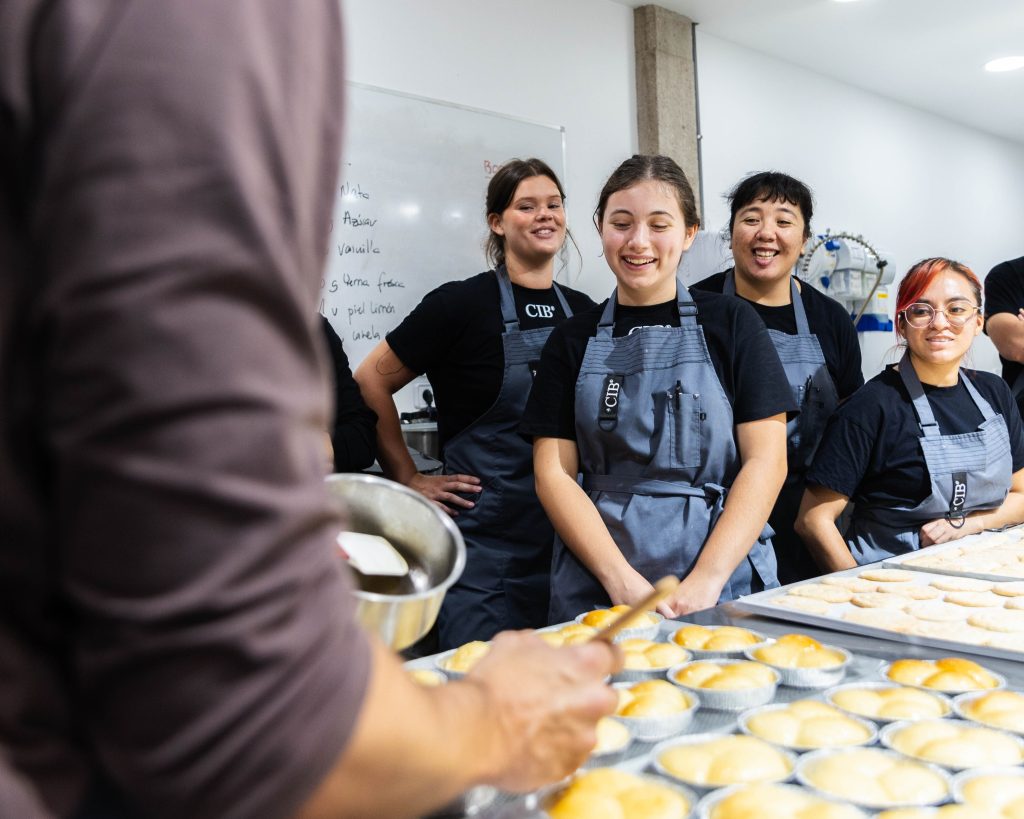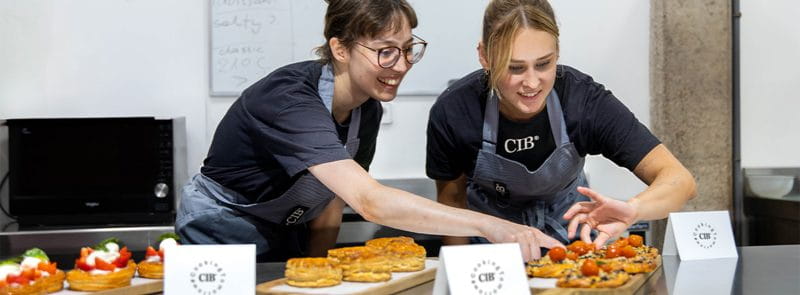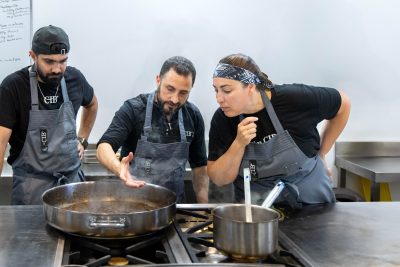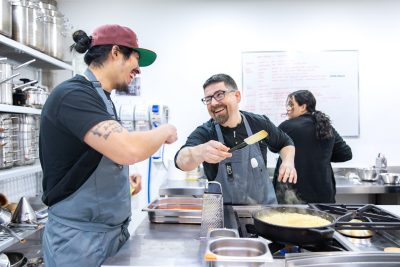The pastry chef profession continues to be a dynamic and rewarding career path. The demand for skilled pastry chefs is growing across hotels, fine dining restaurants, boutique bakeries, and catering services worldwide. From crafting delicate éclairs to leading full-scale dessert programs, the role of a pastry chef combines creativity, precision, and leadership.
Whether you’re an aspiring dessert chef fresh out of culinary school or a seasoned patisserie expert looking to level up, understanding the current salary landscape is interesting for smarter careers moves.
This article breaks down how much a pastry chef earns, looks at salary differences by country and role, and explores what it takes to climb the pay scale in this competitive industry.
Salary range from entry-level to expert
Salaries in the pastry profession can vary greatly depending on the position within the brigade. Below is an estimated breakdown of average annual salaries based on role and region:
| Position | Europe (EUR/year) | North America (USD/year) | South America (USD/year) |
| Executive Pastry Chef | 55 – 65K | 70 – 85K | 40 – 50K |
| Had Pastry Chef | 45 – 55K | 60 – 70K | 30 – 40K |
| Pastry Chef | 35 – 45K | 50 – 60K | 20 – 30K |
| Assistant Pastry Chef | 30 – 35K | 42 – 50K | 15 – 20K |
| Pastry Cook / Commis Chef | 25 – 30K | 35 – 42K | 10 – 15K |
The pastry chef’s salary, as in other job positions, depends on several factors:
- Location: Chefs working in countries known for their food culture and with strong economies often earn more. That said, these places usually come with higher living costs.
- Role and duties: The more responsibility a chef has—like managing staff, shaping the menu, or running kitchen operations—the more they tend to earn.
- Type of establishment: Jobs in luxury venues, such as five-star hotels or award-winning restaurants, typically come with better salaries.
- Experience level: Chefs who’ve built their careers in top-tier kitchens usually command higher pay thanks to their skills and track record.
- Industry connections: A chef with a strong name and good relationships in the industry often has access to better opportunities and leadership roles.
- Education and credentials: Completing training at prestigious culinary schools can lead to better job offers and higher salaries.
Pastry salaries by country
| Country | Average Salary | Estimated range (annually) | Key cities |
| Switzerland | CHF 71,5K | 51,8 – 85,5K CHF | Zurich, Geneva, Bern |
| Luxembourg | EUR 65K | 47 – 78K EUR | Luxembourg City |
| Canada | CAD 43K | 38 – 70K CAD | Toronto, Vancouver, Montreal |
| EE.UU | USD 61,5K | 54,5 – 68,5K USD | New York, Los Angeles, Chicago |
| Australia | AUD 74K | 65 – 86K AUD | Sydney, Melbourne, Brisbane |
| Norway | NOK 545,5K | 395,5 – 653,5 NOK | Oslo, Bergen, Stavanger |
| United Kingdom | GBP 27,4K | 24 – 35K GBP | London, Manchester, Edinburgh |
| France | EUR 40K | 29 – €48K | Paris, Lyon, Marseille |
| Germany | EUR 48K | 35 – 58K EUR | Berlin, Munich, Hamburg |
| Denmark | DKK 364K | 268 – 443K DKK | Copenhagen, Aarhus, Odense |
* These figures are approximate and may vary depending on a pastry-chef’s experience, type of establishment, and specific location. Other factors such as cost of living and local tax policies can also affect net income.
Pastry entrepreneurial spirit
Many pastry chefs eventually dream of starting their own venture—whether it’s a boutique bakery, dessert brand, catering service, or pastry studio. Entrepreneurship offers more freedom, creative control, and long-term income potential than traditional roles.
Running your own pastry business requires more than great recipes. You need to understand pricing, marketing, operations, and customer service. Education or training in business basics can give you a serious edge here.
Countries like France, Spain, Japan, Switzerland, and the United States have strong pastry cultures and support for small food businesses, making them fertile ground for pastry entrepreneurs. Social media and e-commerce also make it easier than ever to build an international customer base.
If you’re ambitious and ready to lead, entrepreneurship could be your fastest route to financial and creative independence.
How does education influence the salary of a pastry chef?
Education can make a real difference in how much you earn as a pastry chef. Having a strong foundation—especially from a respected culinary school—can help you start your career on a higher rung of the salary ladder. And the more specialized your training, the more valuable you become in a competitive job market.
If you’ve been through a structured pastry program, chances are you already know how to work with doughs, temper chocolate, create sugar sculptures, and execute other techniques with precision. More importantly, you’ve probably developed the work habits, discipline, and sense of organization that employers expect from professionals. If you are starting from scratch, you can train in programs such as PEC·D1 Professional Pastry and Baking, which prepares you to work with professional standards from day one.
At the start of your career, that kind of preparation is a big advantage. Chefs with formal education are more likely to land jobs in respected hotels, restaurants, and patisseries—often with better pay. To employers, trained chefs are seen as ready-to-go: they understand how kitchens run and don’t need the same level of handholding.
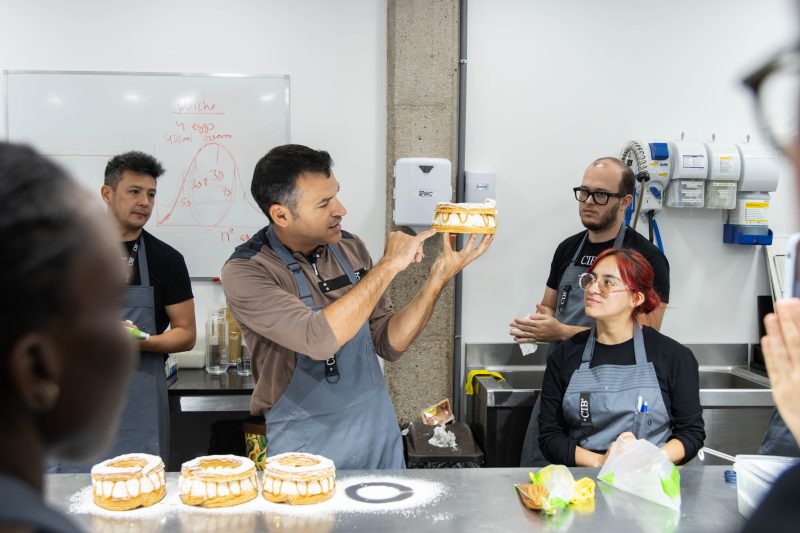
Education as a salary accelerator
As your career moves forward, education keeps paying off. Continuing to learn—whether that’s through advanced courses, certifications, or workshops—can help you qualify for higher-level roles like chocolatier, pastry consultant, or executive pastry chef. In many places, certified pastry chefs can earn 10–20% more than their uncertified peers.
That’s where CIB’s pastry programs come in.
The Culinary Institute of Barcelona doesn’t just teach you recipes and techniques—it prepares you for what real professional kitchens demand. With hands-on practice, real-world projects, and international training standards, our courses are designed to get you job-ready and salary-competitive.
Whether you’re just beginning or looking to specialize, there’s a program that fits:
- PEC·D1 Professional Pastry and Baking: perfect for building your core pastry skills.
- PEC·D2 Advanced Pastry and Chocolate: for chefs who want to go deeper and master high-level techniques.
- PCD Pastry Chef Diploma: a complete program that takes you from the basics to advanced pastry leadership.
How to aim for higher salaries?
Boosting your income as a pastry chef takes more than just talent—it’s about being smart with your career moves.
Professional experience
The more time you spend in the kitchen, the more valuable you become. It’s not just about years—it’s about how much you’ve learned, the kinds of kitchens you’ve worked in, and what you’ve handled on the job.
Chefs with 5–10 years under their belt often make significantly more than new grads. And if you’ve worked in different types of kitchens—like high-end hotels, busy bakeries, or with well-known chefs—you bring a wider skill set that employers are willing to pay for.
Level of responsibility
Your title matters. Entry-level roles like commis or assistant pastry chefs are important but mostly support-focused. When you move into leadership roles—head pastry chef, production manager, executive pastry chef—you take on more responsibility, and your pay reflects that.
Managing a team, creating menus, running inventory, and overseeing prep are all leadership tasks. If you want to move up, start by stepping into these roles when the opportunity arises, even informally.
Leadership ability
Kitchens run on teamwork, and chefs who can lead are always in demand. Beyond technique, leadership means staying calm under pressure, keeping your team on track, and making sure the quality never drops.
If you can take the initiative, mentor junior staff, and help keep operations smooth, you’ll get noticed—and promoted. Strong leaders often get first access to higher-salary roles because they bring stability and trust.
Geographical location
Where you work has a huge impact on what you can earn. Cities like Paris, Zurich, or New York tend to offer the highest salaries but also come with higher living costs. In contrast, smaller cities or rural areas might pay less but still offer a great quality of life because expenses are lower.
Some regions, like Switzerland or Luxembourg, have a deep food culture and pay well across the board. And emerging food cities often have growing demand, which can work in your favor. If you’re open to relocating, take time to compare not just salary figures, but job availability and cost of living too.
Factors Influencing Pastry Chef Earnings
There’s no single number that defines what a pastry chef earns. Your salary depends on a mix of things—some you can control, and some you can plan around. Here’s what matters most:
Experience level and its impact on pay
More experience usually means more money. When you’re starting out, your focus is on learning the ropes—precision, timing, consistency. As you grow, you take on more complex tasks: planning production, designing desserts, and leading a team.
After three to five years, many chefs see a solid pay increase. By the 10-year mark, especially with leadership experience, many are eligible for top-tier roles that come with decision-making power—and significantly higher salaries.
Education and certifications
Practical experience is key, but education rounds it out. A solid culinary school background makes you a more attractive candidate and shows that you’re serious about your craft.
Importance of Culinary School and Certifications
Graduating from a well-known program shows employers that you’re trained, disciplined, and understand the basics of how a kitchen operates. You’re not just creative—you’re reliable.
Certifications in specific areas, like sugar work, chocolate artistry, or dietary specialties, can also increase your earning potential. They show expertise in fields that are in high demand—especially in luxury or specialized settings. CIB’s pastry programs are built to give chefs these credentials, helping them grow into more lucrative positions over time.
Specialized skills and their effect on income
The more refined your skillset, the more you can charge. Chefs with unique specialties often earn more—even if their job titles are the same. Here are a few in-demand niches:
- Artisan bread professionals are prized in high-end bakeries
- Plated dessert specialists are key in fine dining and tasting menus.
- Vegan/gluten-free pastry chefs are increasingly needed in health-conscious markets.
If you’ve invested time in mastering something unique, you’ll likely have more leverage when negotiating pay.
Type of Establishment and Salary Variations
Not all kitchens pay equally. A high-end hotel in Geneva will offer a different salary than a family bakery in a small town. It’s not always about skill—budget, clientele, and reputation of the place also count.
Luxury hotels, Michelin-starred restaurants, and cruise lines tend to pay top dollar—and often offer perks like housing, travel, or bonuses. However, smaller operations may offer more freedom and balance, even if the paycheck is lighter.
Think about what you value: salary, creativity, schedule, or growth. The “best” job might not always be the highest-paid one.
Location
Your zip code affects your paycheck. Big culinary cities like London, Paris, or LA pay more—but rent, transport, and food cost more too. Sometimes, a lower salary in a lower-cost area can mean more money in your pocket.
If you’re thinking of moving for work, look at the full picture. What’s the job market like? What’s the cost of living? Is there room to grow? These questions matter just as much as the salary itself.

